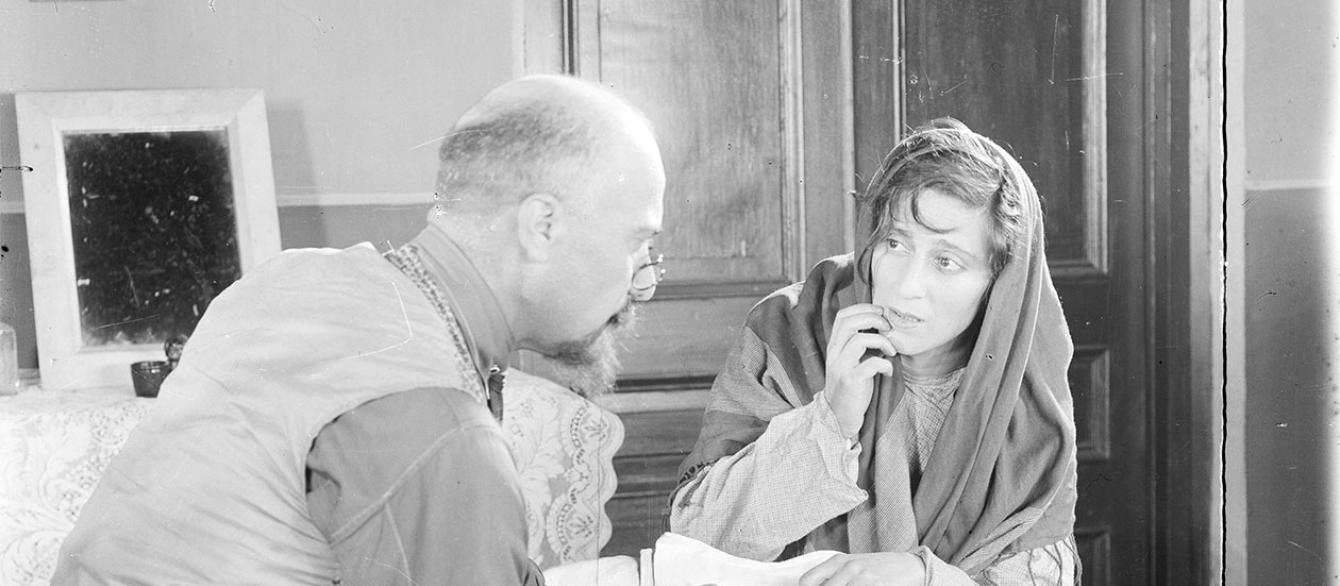Join the Harvard Film Archive for a series of silent films from Georgia.
Saba is a tram operator in Tbilisi. His life spirals downward when he loses his job in the wake of a violent, drunken night. In the course of yet another drinking bout, Saba nearly kills a loved one in a tram crash (the drunken tram driving around the city at night is one of the most daring sequences in the film). He is then given a second chance to sober up for the good of his family and his work. As becomes clear from this description, Saba is a temperance drama, a film genre with a long history and a set of well-known cliches. The film abides by them all: a wife (the majestic Veriko Andjaparidze) struggling to draw out her husband from a bar, a playing child wronged by the angry father, etc. At the same time, Saba surprises us with unexpected twists—not so much story twists, as twists in the cultural context, ideological messaging and, most importantly, visual style. On Saba, Mikheil Chiaureli, a painter-turned-filmmaker, was helped by two other artists, Lado Gudiashvili and Davit Kakabadze—very resonant names in the world of Georgian avant-garde. Their collaboration resulted in a series of contrasting cinematic spaces. Saba and his family live in a basement flat and walk bleak, depressing streets that resemble a German Expressionist movie or Hitchcock's Lodger with its eternal night and rain. While looking at Saba and his family’s everyday enviroment, you start wondering if colors really exist; by contrast, the fateful bar that Saba frequents exsudes humour, brightness and colorfulness so powerful you forget you are watching a black-and-white movie. Like it or not, the film seems to whisper in your ear—against the grain of being conceived as a cautionary tale—in this environment, the bar is actually where Georgian culture lives, even if in its modern and urban form. This is where one of the most memorable sequences of the film takes place: a grotesque party of the “ex-people” (people of any social class other than proletariat, in early Soviet parlance) who, the visual sarcasm on the part of filmmakers notwithstanding, hold on to traditional Georgian culture, wine and other celebratory customs included. The film, of course, affirms the importance of class struggle and the like, but as often with silent filmmakers, especially under censorship and ideological pressure, it is more important to look at what they do, not what they say.
Written by Daria Khitrova
Sponsorship
This event is cosponsored by the Harvard Film Archive and the Department of Slavic Languages and Literature, with support from the Program on Georgian Studies.
The Program on Georgian Studies is an activity of the Davis Center for Russian and Eurasian Studies at Harvard University and is made possible by a sponsored research award from the Ministry of Education and Science of Georgia.
Accessibility
The Davis Center for Russian and Eurasian Studies at Harvard University encourages persons with disabilities to participate in its programs and activities. If you anticipate needing any type of accommodation or have questions about the physical access provided, please contact us at 617-495-4037 or daviscenter@fas.harvard.edu in advance of your participation or visit. Requests for Sign Language interpreters and/or CART providers should be made at least two weeks in advance if possible. Please note that the Davis Center will make every effort to secure services but that services are subject to availability.




